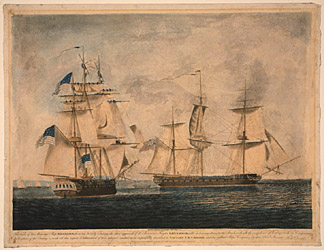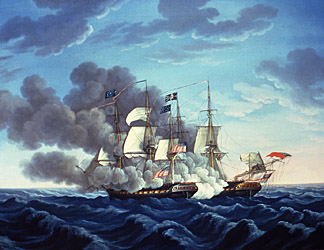The War of 1812
Although its events inspired one of the nation’s most famous patriotic songs, the War of 1812 is a relatively little-known war in American history. Despite its complicated causes and inconclusive outcome, the conflict helped establish the credibility of the young United States among other nations. It fostered a strong sense of national pride among the American people, and those patriotic feelings are reflected and preserved in the song we know today as the U.S. national anthem.
Britain’s defeat at the 1781 Battle of Yorktown marked the conclusion of the American Revolution and the beginning of new challenges for a new nation. Not even three decades after the signing of the Treaty of Paris, which formalized Britain’s recognition of the United States of America, the two countries were again in conflict. Resentment for Britain’s interference with American international trade, combined with American expansionist visions, led Congress to declare war on Great Britain on June 18, 1812.
In the early stages of the war, the American navy scored victories in the Atlantic and on Lake Erie while Britain concentrated its military efforts on its ongoing war with France. But with the defeat of Emperor Napoléon’s armies in April 1814, Britain turned its full attention to the war against an ill-prepared United States.
The Capital CapturedCollect Stars To Complete The Flag
What British actions led to the war of 1812?
- British intrusion into American international affairs and trade
- The British burned down the White House and Capitol building
- Both of the above
-

USS Chesapeake Captured
U.S. Frigate Chesapeake and the British Frigate Shannon. Aquatint by Robert Dodd, 1813.
-

USS Constitution Battles HMS Guerriere
Action between the USS Constitution and the HMS Guerriere, August 19, 1812. Painting by Michel Felice Corne.

